Government Spokesman Ali Rabiei announced on Saturday that from Monday, October 26 until November 20, only half of the government employees will be at work.
The government spokesman noted that the National Coronavirus Headquarters has approved tough restrictions for 43 cities that are in emergency situation due to non-compliance with health protocols; and these restrictions will be applied as of Monday this week. He said the list of these cities will be announced to the governors later on.
Rabiei stated that with these restrictions, occupation groups 2, 3 and 4 will be shut down to harness the disease prevalence.
“Obviously, jobs related to daily life and essential needs of the people, including emergency services, service and administrative centers, security centres, chain stores, supermarkets, bakeries, etc., will continue their operation,” he noted.
According to a government directive, the occupation group 2 includes: Shopping malls that sell non-edible stuff, sports activities, holy places, civil service and organsations, mosques, confectionaries, nuts stores, juice and ice-cream shops, restaurants, barber shops, car dealing centres, car plate centres, rug and carpet shops, toy stores, home appliances shops, printing centres, interior designing shops, gift shops, garment wholesale and retailers, clothes markets, photo ateliers, real estate agencies, curtain shops, furniture stores, shoes and bags stores, stationary shops, tailor shops, and cosmetics stores.
Occupation group 3 includes: Universities, schools, seminaries, technical schools, language centers, libraries, kindergartens, indoor swimming pools, cinemas, theatres, museums, reception halls, hairdressing shops, mosques, public transportation (with limited activity), and in-person exams.
Occupation group 4 are social, cultural and religious events, sports such as wrestling, karate, and judo, holy shrines, dorms, cafes, teahouses, zoos, fun fairs, indoor sports, and aqua recreational centres.
In his Saturday remarks, Rabiei said the heads of the organisations must do the necessary planning so that there will be no disruption in giving service to the clients, and the organisations must do all the duties assigned to them.
